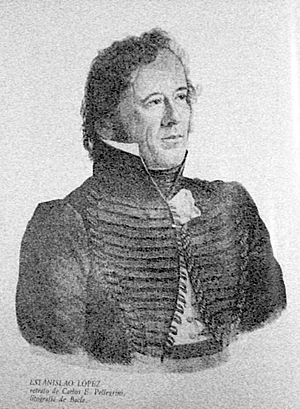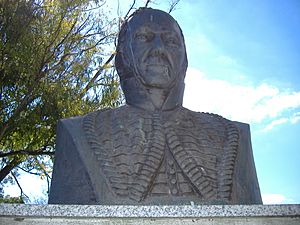Estanislao López facts for kids
Quick facts for kids
Estanislao López
|
|
|---|---|
 |
|
| Governor of Santa Fe | |
| In office 23 July 1818 – 15 June 1838 |
|
| Preceded by | Mariano Vera |
| Succeeded by | Domingo Cullen |
| Personal details | |
| Born | 26 November 1786 Santa Fe, Viceroyalty of Río de la Plata |
| Died | 15 June 1838 (aged 51) Santa Fe, Argentine Confederation |
| Nationality | |
| Political party | Federalist |
| Spouse | María Josefa del Pilar Rodríguez del Fresno |
| Occupation | Army officer |
| Signature |  |
Estanislao López (born November 26, 1786 – died June 15, 1838) was an important leader and governor of the province of Santa Fe, Argentina. He was governor for 20 years, from 1818 to 1838. López was a strong supporter of "federalism," which meant he believed each province should have more power and control over its own affairs. He thought this was better than a central government in Buenos Aires making all the decisions. He worked closely with other leaders like Juan Manuel de Rosas during a time of civil war in Argentina. Many people in Santa Fe remember him as a key figure in their history.
Contents
Early Life and Military Service
Estanislao López was born in Santa Fe. When he was 15, his father sent him to fight against raids in the Gran Chaco region. This was his first experience in the military.
He later fought to take back Buenos Aires from the British in 1806. He also served in the Argentine War of Independence. During this war, he fought under Manuel Belgrano, who created the Argentine flag. In 1810, López was held as a prisoner in Montevideo.
Becoming Governor of Santa Fe
In 1816, López led his men in an uprising against Buenos Aires. The Buenos Aires army, led by General Juan José Viamonte, had to surrender. This made López a hero, along with José Gervasio Artigas, a leader from the Banda Oriental (which is now Uruguay).
After this success, López took control of the government in Santa Fe in 1818. He removed the previous governor, Mariano Vera. He also made Santa Fe separate from Buenos Aires' control. He ruled for 20 years, with the support of the people. He was formally elected governor on July 1, 1818, and was reelected many times after that.
López did not agree with a proposed constitution for Santa Fe that would have given Buenos Aires too much power. So, he wrote a new one. His constitution allowed the people to directly vote for their governor. This new constitution was approved on August 26, 1819. On December 17, he married María Josefa del Pilar Rodríguez del Fresno. They had seven children together.

Fighting for Provincial Power
López formed alliances with other regional leaders. He first allied with Artigas, and then with Francisco Ramírez, a leader from Entre Ríos. Together, they built large armies to fight against Buenos Aires. At that time, Buenos Aires was led by Supreme Director Juan Martín de Pueyrredón.
General José de San Martín, a hero of the Independence Wars, asked López and Artigas to stop fighting among themselves. He wanted them to join the national cause for independence. San Martín also refused Pueyrredón's request to use his troops to defend the central government.
After Pueyrredón resigned, López went to war again. He joined forces with Ramírez, former Supreme Director Carlos María de Alvear, and José Miguel Carrera from Chile. These allies defeated the Buenos Aires forces led by José Rondeau. This happened at the Battle of Cepeda on February 1, 1820. This battle ended the Supreme Directorship and showed the strength of the provinces.
Peace was agreed upon through the Treaty of Pilar on February 23, 1820. This treaty was signed by Governor Manuel de Sarratea of Buenos Aires, along with López and Ramírez.
Leading the Littoral Provinces
In 1821, López's alliance with Francisco Ramírez ended. Ramírez was killed near Coronda by some of López's soldiers. This happened when Ramírez was crossing Santa Fe's territory to attack Córdoba. After this event, López became the undisputed leader of the coastal provinces.
On April 7, 1822, he signed the Quadrilateral Treaty. This treaty was signed with Entre Ríos, Corrientes, and Buenos Aires. It called for national unity and planned for a Constitutional Assembly to be held in Santa Fe.
López also helped Juan Manuel de Rosas when Rosas had to flee after his army was defeated. López then joined forces with Rosas to defeat Juan Lavalle at Puente de Márquez on April 26, 1829. However, Rosas later made peace with Lavalle without López's agreement, which caused tension between the two allies.
The Federal Pact and Later Years
In 1831, Rosas was the governor of Buenos Aires. The coastal provinces were threatened by the "centralist" Unitarian League, led by José María Paz. To protect themselves, the four provinces signed the Federal Pact on January 4. This pact created a military alliance and laid the groundwork for a federal organization of the country.
After Paz was captured, the civil war calmed down for a while. This allowed Rosas to have more influence at the national level.
Estanislao López continued to rule Santa Fe until his death on June 15, 1838. Domingo Cullen succeeded him as governor.
The Estadio Brigadier General Estanislao López (a stadium) and the Brigadier Estanislao López Highway are named after him.
| Preceded by Mariano Vera |
Governor of Santa Fe 1818–1838 |
Succeeded by Domingo Cullen |
Sources
In Spanish unless otherwise noted.
- Todo-Argentina.net - Biography.
- WebFe - History of Santa Fe (timeline).
- José de San Martín, el Libertador - Biography of General San Martín.
- ArgentinaWorld - History of Santa Fe.
- Treaty of Pilar, 23 Feb 1820 (complete text, MS Word 2000 DOC file).
- Santa Fe - History of the city of Santa Fe (official website).
- Constitución de la Provincia de Santa Fe (1819) (complete text of the 1819 provincial constitution, MS Word 2000 DOC file).
See also
 In Spanish: Estanislao López para niños
In Spanish: Estanislao López para niños
 | James B. Knighten |
 | Azellia White |
 | Willa Brown |

